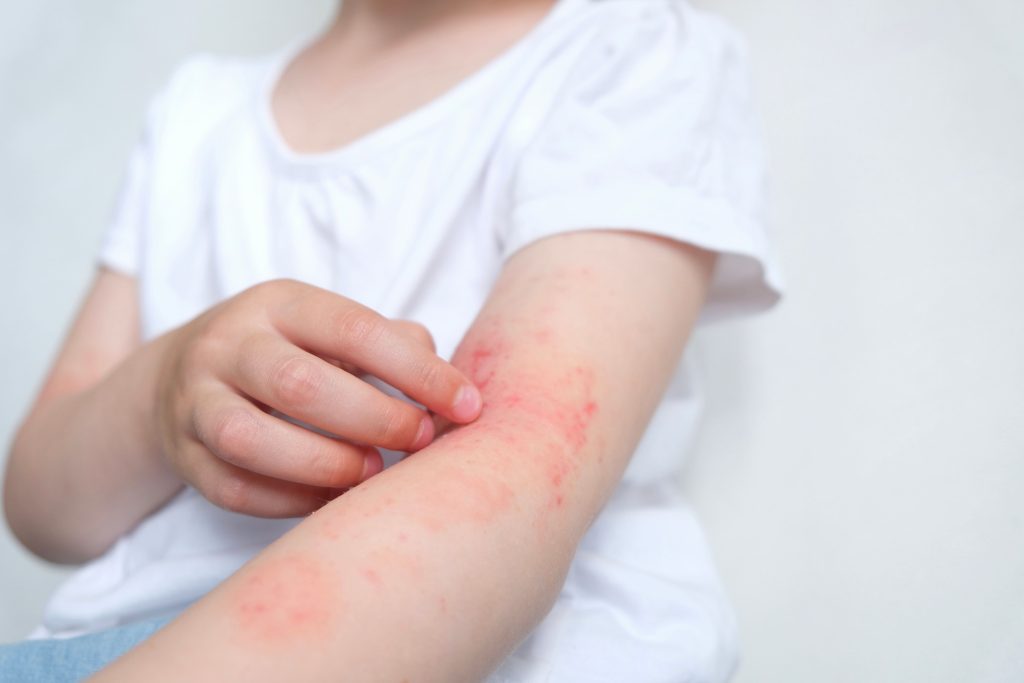Back to General Dermatology

What is Eczema?
Eczema, also known as atopic dermatitis, is a chronic inflammatory skin condition that causes the skin to become red, itchy, and inflamed. It commonly appears during infancy or early childhood but can persist or develop later in life. The etiology of eczema is multifactorial, including genetic, environmental, and immunology factors.
Symptoms of Eczema
- Dry and itchy skin: Eczema usually begins with dry, sensitive skin that becomes intensely itchy, leading to scratching and the development of a rash. This itch scratch cycle led dermatologists to call eczema “the itch that rashes”.
- Redness and inflammation: Affected areas of the skin may become red, swollen, or warm to the touch.
- Rash and patches: Eczema commonly presents as a rash with small, raised bumps and dry skin patches that may ooze or crust over. These rashes can occur on any part of the body but are most common on the face, hands, feet, inside of elbows, and behind the knees.
- Thickened and scaly skin: In chronic cases, the skin may thicken and become scaly or develop areas of discoloration. This process is referred to as lichenification.
- Infections: Because the skin surface barrier is compromised, areas of eczema are more prone to infections. This includes bacterial (staphylococcus, streptococcus) and herpetic infections.
Causes and Triggers
- Genetic factors: Eczema tends to run in families. People with eczema often have a personal or family history of the “atopic” triad such as allergies, asthma or eczema.
- Immune system dysfunction: Individuals with eczema have an overactive immune system that responds abnormally to certain triggers, leading to inflammation and skin reactions.
- Environmental factors: Various environmental factors can trigger or worsen eczema symptoms, including dry or cold weather, irritants like harsh soaps or detergents, allergens such as pollen or pet dander, and certain fabrics or clothing materials.
Treatment and Management
- Moisturizing: Regularly applying emollients helps to hydrate and protect the skin, reestablish the skin barrier, and reduce dryness and itching.
- Avoiding triggers: Identifying and avoiding triggers that worsen eczema symptoms is crucial. This may involve testing for triggers, and modifying the environment to avoid allergens.
- Topical corticosteroids: Topical steroids are the cornerstone of eczema treatment and can help to reduce inflammation and relieve symptoms during flare-ups.
- Topical steroid sparing treatments: While topical steroids can alleviate eczema, they also have a number of side effects including skin thinning and atrophy. Steroid sparing medications work similarly to steroids in that they calm down the immune system but use a different mechanism of action to avoid side effects. Treatments include Eucrisa® (phosphodiesterase inhibitor), tacrolimus/pimecrilimus (topical calcineurin inhibitors and Opzelura® (topical JAK inhibitor).
- Antihistamines: Oral antihistamines can help to alleviate itching and improve sleep quality.
- Immunomodulators: For more severe cases, systemic medications such as oral steroids, immunomodulators, biologics and JAK inhibitors may be effective.
Eczema can be a challenging condition to manage, but with proper understanding and effective treatment strategies, individuals can find relief. If you or a loved one is dealing with eczema, please call and schedule an appointment with one of our providers who will work with you to develop a personalized treatment plan to help improve your eczema. Remember, early intervention and proper skin care practices are key to managing eczema and improving the quality of life for those affected by it.
